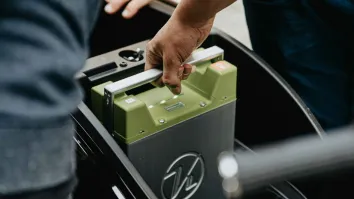
Indonesia restricts social commerce for local traders
New regulation will impact more than 6 million sellers on TikTok Shop, TikTok Indonesia stated.
Offline traders in Indonesia are seeing a significant decrease in revenue, partly due to being unable to compete with imported products sold at extremely low prices on social media platforms. In response, the government has enacted a ban on goods transactions via these platforms, aiming to shield and support the nation's micro, small, and medium-sized enterprises (MSMEs).
Trade Ministry regulation (Permendag) No. 31/2023 concerning Business Licensing, Advertising, Development and Supervision of Business Operators in Electronic Commerce issued on 26 September 2023, mandates the separation of social commerce platforms from e-commerce.
The regulation defines social commerce as referring to social media operators that offer specific features, menus and facilities that enable merchants to post the offering of goods and services. Strictly, social media operators are prohibited from facilitating payment transactions in its electronic systems.
“Social commerce can place ads like TV, but it mustn’t be transactional, they can’t directly sell,” said Indonesia’s Trade Minister Zulkifli Hasan.
The regulation also requires e-commerce platforms in Indonesia to set a minimum price of $100 for certain goods that are directly purchased from abroad.
It also establishes obligations for traders and e-commerce platforms to display trade evidence of standardisation compliance for goods. These include certifications for SNI, halal, safety, health, and environmental registration of products.
Marketplaces and social commerce companies are prohibited from being manufacturers of goods.
This regulation is driven by the aim to create a fair, healthy, and beneficial e-commerce ecosystem, avoiding opportunities for predatory pricing manifested through extremely low prices in social media platforms.
Minister of Cooperatives and Small and Medium Enterprises Teten Masduki mentioned a significant decrease in average revenue of over 50 percent for the sales of offline traders in Tanah Abang, the largest textile market in Southeast Asia located in Jakarta.
He attributed this revenue drop to the fact that traders cannot compete with imported products that are sold at very low prices.
The ban on transactions is also said to prevent the domination of the algorithm and prevent the use of personal data in business interests.
The minister said companies had one week to comply with the regulation or face the threat of closure.
Social commerce boom
During the press conference, the government mentioned that these rules will apply to all e-commerce and did not name any particular player. For many observers, though, the restriction on social commerce is seen as a reference to TikTok.
TikTok is the only social media company that allows direct e-commerce transactions on its platform. To clarify, the Minister stated that TikTok does not yet have a permit to operate as an e-commerce platform.
According to a Populix survey, a consumer insight platform on the social commerce landscape in Indonesia in September 2022, 86% of respondents had experience shopping on social media sites.
Out of 1,020 respondents, 65% considered social commerce as transactions (buying and selling) on social media. Among them, 46% mentioned using TikTok Shop as the most frequently used social media platform for shopping.
Mixed reaction
The Indonesian Association of Small and Medium Enterprises (Akumindo) mentioned that the new regulation provides a fresh opportunity for offline MSME operators to market their products.
It eliminates the feeling of being threatened by the dominance of platforms, as seen in the growing social commerce business.
They are highlighting MSME operators who have struggled to compete in terms of pricing with social commerce platforms that often offer significant discounts or price drops, whilst lower-priced imported products are widely available.
On the other hand, the spokesperson for TikTok Indonesia, in a statement received by Retail Asia on 27 September, said they have received many concerns from sellers seeking clarification on the new regulation.
Tiktok Indonesia maintained that social commerce is a solution to real world problems faced by local traditional small sellers by matching them with local creators who can help drive traffic to their online shops.
Whilst it vows to respect local laws and regulations, TikTok Indonesia said: “We hope that the regulations will take into account the impact on more than 6 million sellers and nearly 7 million affiliate creators who use TikTok Shop.”
Equal playing field
Nailul Huda, a researcher at the Institute for Development of Economics and Finance (INDEF) who frequently studies digital economics, emphasised the importance of clear regulation for social commerce.
The previous trade regulation (Permendag) only regulated online retail, marketplace, daily deals, and price comparison.
“With regulation, it will provide a level playing field among business actors,” he told Retail Asia, adding that with clear regulation, social commerce must be licensed and obtain permits for imported goods.
Huda argued that instead of banning purchases and sales on social media, which he believes can hinder the progress of MSMEs in going digital, the government should focus more on enhancing protection for local products in e-commerce channels.
This can be achieved by tightening regulations on imported goods and cutting back on incentives for imports.
He raised concerns about the recent Ministry of Trade regulation, which does not require the tagging or labeling of imported products on every Electronic Trading System (PPMSE). By implementing product tagging, the government can gain a realistic overview of the influx of imported products, he said.
He also pointed out that the promotion space is still being utilised by imported products. There should be a percentage quota for domestic products, similar to the rules in modern retail, where a minimum of 30 percent of the display in PPMSE is reserved for local products.
Huda said that these regulations on limiting imported products will strengthen the multiplier concept. “When there is a dominance of imported products, the multiplier concept generated by the country will be smaller compared to when local products dominate,” he said.
“Because local products are produced domestically and absorb local labor and raw materials, so indirectly, the community or consumers will also enjoy the multiplier effect with the dominance of local product transactions,” he explained.
Impact on e-commerce
DBS Research Group wrote in its report on 28 September that such restrictions could pose challenges to the potential success of TikTok Shop in Indonesia.
It stated that TikTok Shop might need to apply for separate permits to operate. The idea is for TikTok Shop to demonstrate that its e-commerce business is distinct from its social media aspect, with no sharing of backend data, and it may need to have clear funding sources for e-commerce losses, which were previously supported by advertising revenue from its social media app.
“Although TikTok Shop could obtain a separate app operating permit, this remains challenging. Since most purchases are made impulsively, the need to enter a separate app could result in a high churn rate,” DBS said.
It also noted that regulations establishing a minimum purchase price of $100 for certain items bought from outside Indonesia on e-commerce platforms could also impact TikTok Shop because they rely more on imported goods compared to their competitors.
“The market share of TikTok Shop, estimated at 12-15%, may be distributed among existing players, including Shopee,” DBS said.
Before the Ministry of Trade regulation was issued, DBS wrote that the Indonesian government’s proposal regarding the separation of social commerce and e-commerce would have a positive impact on the national champions GoTo and SEA Ltd through Shopee.

















 Advertise
Advertise









